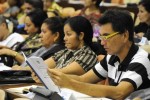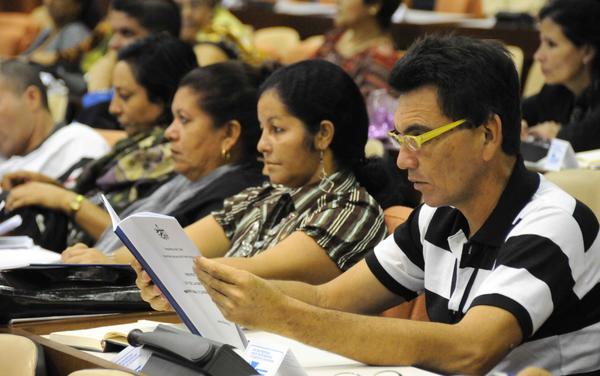 The 10 standing committees of the Cuban Parliament continue their work Friday, as part of the activities prior to the first period of session of the 8th Legislature, scheduled for tomorrow at the Conference Center in Havana.
The 10 standing committees of the Cuban Parliament continue their work Friday, as part of the activities prior to the first period of session of the 8th Legislature, scheduled for tomorrow at the Conference Center in Havana.
The commissions on Constitutional and Judicial Affairs, Economy, Agriculture and Food, Attention to Services, Industry, Construction and Energy, Defense, Education, Culture, Science, and Environment, among others, will define their agenda and discuss work strategies.
Legislators discussed yesterday the results of the latest internal audit performed by the General Comptroller of the Republic (CGR), stressing the leaders’ role in preventing illegalities.
During an analysis of the issue, CGR officials and legislators talked on progresses in the economic and administrative control, but also the persistence of failures that hinder management in several sectors of the national life.
They also decided on the Draft Bill on Maritime, River and Lake Navigation, which will be discussed in the plenary session of the National Assembly of People’s Power (ANPP).
Cuban parliamentarians also considered the draft Labor Code, which will then be subjected to consultation with the workers of the island.
Ana Mari Machado, vice president of the National Assembly, said that we expects during this legislature to expand until 80 the groups of solidarity with other Parliaments, included those of new conformation with Costa Rica, El Salvador, Uruguay and Pakistan, among others.
The current ANPP was formed on February 24, and is comprised of 612 members representing the country’s 168 municipalities.
Those legislators were elected February 3 by direct and secret vote by more than 7.8 million citizens.
Cuban Legislators Approve Bill on Maritime Navigation
The members of the committees on Constitutional and Legal Affairs, and Attention to Services of the Cuban Parliament, approved the Draft Bill for Maritime, River and Lake Navigation.
During the second working day of the First Ordinary Session of the 8th Legislature of the Cuban National Assembly of People’s Power taking place at the Havana’s Conference Center, legislators agreed that the document is in due correspondence with the Constitution and the legal order of the nation.
Jose Luis Toledo, chairman of the Committee on Constitutional and Legal Affairs, stated that the objective is the adoption of a navigation regime based on the geography of the country, which has more than 4,000 cays, islands, and islets.
The text also make an emphasis in maritime trade, finding ways for recovery, modernization, and reorganization of transport, and take advantage of cabotage and shipyards, Toledo said.
This document was debated by Maritime Law specialists, in which 132 remarks, 41 with issues of form and 91 of content, were derived, said Toledo, who stated that after several meetings, the appropriate modifications were drawn up.
Laws concerning the 1886 Commercial Code and other in 1930 and 1950 were also updated and repealed, while the 1977 and 1995 decrees were ratified.
Toledo said that after 60 days of the approval of the bill in the Parliament, the Council of Ministers will announce regulations of the rule, and this will take effect after being published in the Official Gazette.
 Escambray ENGLISH EDITION
Escambray ENGLISH EDITION





Escambray reserves the right to publish comments.